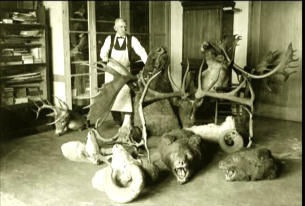

 The Accurate Reloading Forums
The Accurate Reloading Forums  THE ACCURATE RELOADING.COM FORUMS
THE ACCURATE RELOADING.COM FORUMS  Hunting
Hunting  Taxidermy
Taxidermy  Big, Beautiful Striped Girl!
Big, Beautiful Striped Girl!Go  | New  | Find  | Notify  | Tools  | Reply  |  |
| One of Us |
This is a Zebra mare I recently completed and finished. This beauty was taken by Brian Drake, and was part of two-day seminar I gave on mounting the Zebra. Congrats, Brian ... on a beautiful mare!      This shot shows the nose before and after finishing.    I like really this angle! Unfortunately, the only shot I took at this angle was before the final finishing was complete. Here the epoxy work is done, including the Nictitating membrane, using Apoxy Sculpt, before the final painting.  Besides having a set of my "Illumin-eyes" installed, this Zebra was a candidate for my new septum. This big girl is the first to sport my latest innovation. And it is neat. It installs just like any competition Whitetail septum, but on a much larger scale, of course! John. Improving the Quality and Status of Taxidermy Since 1970. | ||
|
| One of Us |
Man, that's pretty! | |||
|
| One of Us |
how do you tell them apart looking at a head mount? Very nice work, by the way. Rich DRSS | |||
|
| One of Us |
Fair question. In this side-by-side comparison, we have a stallion on the left and a mare on the right.  As in most mammals, the male of the species is heavier then the female in all aspects. Notice the heavier, fuller structure of the cheeks; the more heavily muscled and thicker brow above the eyes; the more blocky, almost square appearance of the muzzle/nostril area; and the biggest tell ... the width between the ears! On the male, this area is wider and flatter or more broad across. The female also tends to have a higher peak to the top of the head here, and this is very evident in Lion cubs as well as in adults. Overall, the mare has a much more petite and feminine appearance than the male. It's the same with every mammal species ... from the Whitetail Deer to the African Elephant. Once you make yourself aware of the differences in the sexes, by a deliberate and intense study, you will begin to notice these differences almost immediately. In these profile views, there are obvious anatomical structures that catch the eye and tell you which is the male.   There are, of course, other differences in the size and structure of the bodies that tell them apart. Besides, the heavier, more masculine head, take note of the thickness of the neck. The legs of the male are thicker and heavier than those of the female. Along the torso, the male has a longer body than the female. She needs a shorter, more stout body for carrying a foal to term. A longer body would cause back trouble for the pregnant mare, whereas the short torso can easily spread outward at the sides.  The stallion, naturally, never gets this look!  The trouble for Taxidermists, is that most supply companies carry headforms that were originally sculpted for a Zebra stallion. It usually takes a lot of alteration to get the headform altered down to fit a mare properly. It's not really a problem ... just one more thing a Taxidermist needs to know. I hope this has been of some help in clarifying the differences between the sexes of the Zebra. John. Improving the Quality and Status of Taxidermy Since 1970. | |||
|
| One of Us |
Nice work,John | |||
|
| Powered by Social Strata |
| Please Wait. Your request is being processed... |
|
 The Accurate Reloading Forums
The Accurate Reloading Forums  THE ACCURATE RELOADING.COM FORUMS
THE ACCURATE RELOADING.COM FORUMS  Hunting
Hunting  Taxidermy
Taxidermy  Big, Beautiful Striped Girl!
Big, Beautiful Striped Girl!

Visit our on-line store for AR Memorabilia

